| World |
| United We Win | |
| Only shared efforts can defeat COVID-19 in the era of globalization | |
|
|
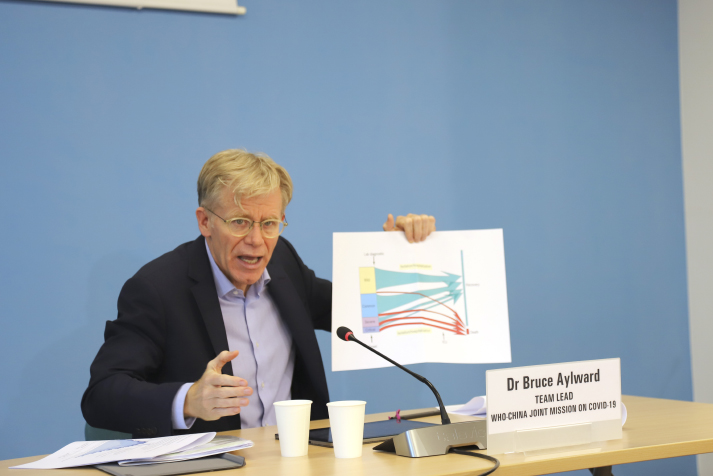 Bruce Aylward, an epidemiologist who led an advance team from the World Health Organization (WHO), speaks at a press briefing at the WHO headquarters in Geneva, Switzerland, on February 25. He said China has changed the course of the COVID-19 outbreak (XINHUA)
Wei Shanshan, who lives in Jianghan District in Wuhan, received a call saying there was a package for her from Kyoto, Japan. It was the 26th day of the sealing off of the city in Hubei Province, central China, which is the epicenter of the novel coronavirus disease (COVID-19) outbreak. On her way to fetch the package at the gate of her community, Wei thought to herself, maybe it is from a friend studying in Japan. But she was not sure because her friend studies in Tokyo, not Kyoto.
Wei got the package and opened it quickly. There were 165 masks, some chocolates, a bottle of disinfectant fluid and a postcard, which read, "Wish you good health, from Aoki," in both Chinese and Japanese. When she saw the sender's name, she couldn't help crying. Lady Aoki was the owner of a kimono shop in Kyoto where Wei had rented a kimono during her trip to Japan last April. Aoki recorded customers' addresses and phone numbers as a keepsake. "I was moved because we hadn't spoken again after I returned to China. I would like to personally thank her after the epidemic ends," Wei said, teary-eyed. Wei's case is one of many across China since the outbreak of the virus. China has received material and moral support from across the world. Contagious viruses respect no borders. In an interconnected world, no country is an island. Humanity shares a common destiny, Koh King Kee, President of the Center for New Inclusive Asia, a Malaysia-based think tank, said. 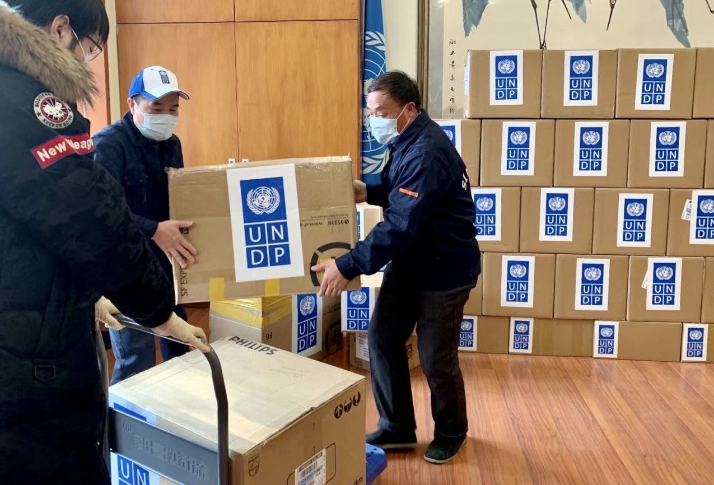 Staff members transfer medical supplies provided by the United Nations Development Programme to help China combat the novel coronavirus in Beijing on February 12 (XINHUA)
Neighborly help
After the outbreak in China, neighboring countries such as Japan, the Republic of Korea (ROK) and members of the Association of Southeast Asian Nations (ASEAN) were also under pressure as a result of the frequent personnel and economic exchanges with China. But they all lent a helping hand right the first time. To better help China fight the epidemic, Japan mobilized money and supplies. Cities like Tokyo, Oita and Kumamoto donated some of their own emergency stockpiles. On February 8, a 14-year-old Japanese girl wearing a cheongsam took to a Tokyo street with her mother, calling on people to donate money for Wuhan. A video recording the scene went viral on Chinese social media platforms later, touching many viewers. The ROK was among the first countries to deliver assistance to China. It offered large amounts of medical and anti-epidemic materials, including 2 million face masks, 1 million medical masks, 100,000 hazmat suits and 100,000 pairs of goggles, according to a report by Xinhua News Agency. As neighbors linked by mountains and rivers, ASEAN countries have stood together with China since the outbreak. When some countries overreacted and imposed travel bans on Chinese travelers, Cambodian Prime Minister Hun Sen changed his schedule to pay a special visit to China on February 4. Thai Prime Minister Prayuth Chan-o-cha made a video to convey the deep friendship between Thailand and China. The Special ASEAN-China Foreign Ministers' Meeting on COVID-19 was held in Vientiane, Laos, on February 20, and issued a statement expressing ASEAN's full support for China's fight against the epidemic. Parallel to the meeting, clinical specialists from China and ASEAN countries held a video conference where they exchanged therapeutic plans and treatment experiences. Along with providing an enormous amount of urgently needed medical supplies, Russia also sent a delegation of anti-epidemic experts to China to jointly carry out research and development on vaccines and drugs. To defeat the virus, humanity must unite and the international community must cooperate, said Kazuteru Saionji, a visiting professor at Higashi Nippon International University in Japan. "The fight against the virus is tough and challenging. But I believe China will win," he said. 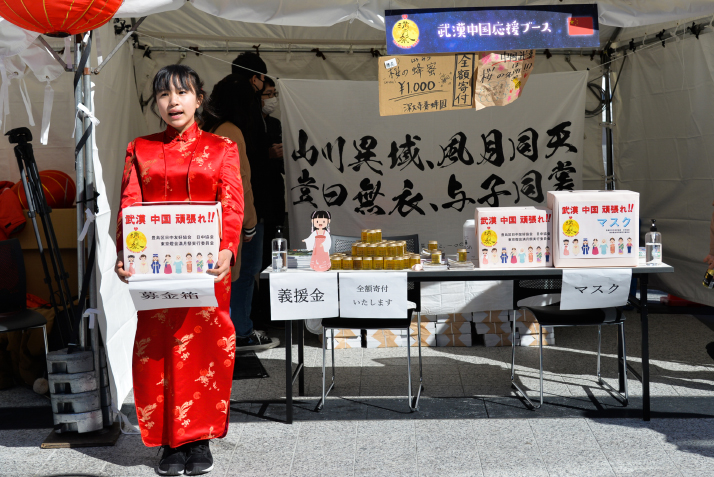 A Japanese girl wearing a cheongsam in Tokyo, Japan, raises money to help people affected by the novel coronavirus in China on February 8 (XINHUA)
Assistance from afar
Known as one of the world's leading "virus hunters," Columbia University professor Walter Ian Lipkin arrived in China on January 29 to assist with the efforts to contain the spread of the novel coronavirus. This is not the first time he has come to China's aid. During the outbreak of severe acute respiratory syndrome in 2003, Lipkin was invited to assess the state of the epidemic, identify scientific gaps and develop a strategy for containing the virus and curtailing infections and deaths. The Bill & Melinda Gates Foundation pledged up to $100 million in emergency funding, much of which will help China bolster epidemiological research, emergency intervention and the research and development of drugs, vaccines and diagnostics. To express the Chinese people's gratitude, President Xi Jinping replied to a letter from Bill Gates, saying he appreciated the generosity of the foundation and Gates' letter of solidarity to the Chinese people at such an important moment. European leaders have also shown support for China's fight. French President Emmanuel Macron has called Xi twice to discuss the outbreak and cooperation. Premier Li Keqiang and European Commission President Ursula von der Leyen pledged closer cooperation in winning the battle against the virus during a phone call. The EU and its members delivered 12 tons of much-needed personal protective equipment to China, while the French Consulate General in Wuhan decided not to leave the city to show its solidarity with the affected population. Many multinational corporations have pitched in to fight the epidemic. Microsoft China announced a 1-million-yuan ($145,000) donation to the Hubei Red Cross Foundation for relief efforts, while computer maker Dell committed to a 2-million-yuan ($290,000) donation. African countries have expressed their support in various ways. At the end of its 36th ordinary session on February 7, the African Union Executive Council released a statement expressing solidarity with China. They are also doing their part to concretely help China, with countries such as Equatorial Guinea making monetary donations and Ghana donating protective masks. Moreover, the Ethiopian Student Association in Wuhan issued a public proposal to support China and Wuhan, while some African students in China have gone to the frontline of the epidemic to serve as volunteers. 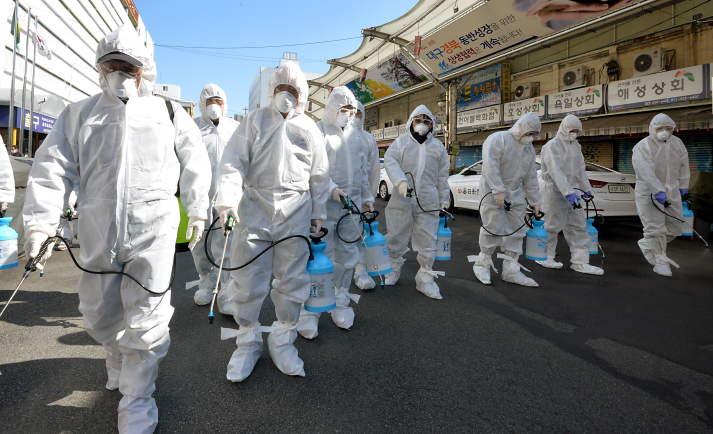 Epidemic prevention workers disinfect a market in Daegu, the Republic of Korea, on February 23 (XINHUA)
International recognition
China's efforts to contain the novel coronavirus have been highly commended by worldwide experts and leaders. Singaporean Foreign Minister Vivian Balakrishnan said on February 19 that his country appreciates and respects China's arduous efforts and sacrifices, adding that his country would continue to firmly support China. Philippine Foreign Secretary Teodoro Locsin said his government and the people speak highly of and support the effective measures China has taken to fight the epidemic, and will do their best to work for unity and cooperation between China and ASEAN. On February 24, the World Health Organization (WHO)-China Joint Mission held a press conference on COVID-19 after its weeklong field investigations in Beijing, Guangdong Province, Sichuan Province and Hubei. The team, made up of experts from China and WHO, said China's unprecedented response has yielded notable results in blocking human-to-human transmission and preventing, or at least delaying, hundreds of thousands of cases. China has played a critical role in protecting the international community, buying precious time for countries to adopt active prevention and control measures and providing them with worthwhile experience. "This approach of all-of-government and all-of-society is very old-fashioned and has averted and probably prevented at least tens of thousands even hundreds of thousands, of cases. It is extraordinary," said Bruce Aylward, a senior adviser to the WHO director general and head of the foreign expert panel. He also said that mass isolation, shutting down transportation and mobilizing the public to abide by hygienic practices have proven effective in curbing a contagious and mysterious disease. "To the people of Wuhan, it is recognized that the world is in your debt. When this disease is over, hopefully we will have a chance to thank the people of Wuhan for the role they have played," he added. 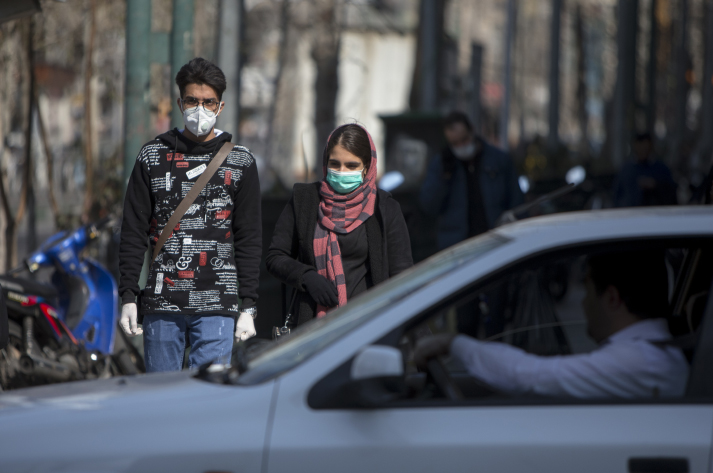 People wear masks in Tehran, the capital of Iran, on February 23, as the country faces a major COVID-19 outbreak (XINHUA)
Concern and cooperation Now, as China seems to be bringing the epidemic under control, some countries are facing the mounting challenge of the possible spread of the virus, including the ROK, Japan, Italy and Iran. China will provide assistance and share its experience and strength with these countries, Foreign Ministry spokesperson Zhao Lijian said. As of February 28, more than 900 coronavirus infection cases had been confirmed in Japan and more than 2,000 in the ROK, which means China now has to stay alert to both the domestic and foreign spread of the virus. Qingdao, Weihai and many other coastal cities in Shandong Province, east China, have taken prompt measures to prevent the possible spread from outside carriers. But instead of imposing a travel ban like some countries did against China, these local governments have responded to the threat in an appropriate and compassionate manner. According to a Weihai notice issued on February 25, all people entering the city from Japan and the ROK, including foreigners and Chinese citizens, will be put under medical observation in designated hotels paid for by the local government for 14 consecutive days. They will be given single rooms and professional services to ensure they live comfortably and can connect with the outside world freely. By quarantining travelers for 14 days, the Chinese cities are trying to strike a balance between normal personnel exchanges and public health security. Moreover, after learning Japan lacked test kits, China donated a batch of coronavirus test kits, even though it too needs them. "China has been following the development of the COVID-19 epidemic in Japan and the ROK," Zhao said, adding that China is "deeply grateful" for the help it has received from these two countries. As close neighbors, it is natural for China, Japan and the ROK to cooperate with and help each other during difficult times. "Though China is still fighting hard against the virus at home, we are ready to share information and experience with relevant countries to help them to the best of our ability," Zhao said. Copyedited by Rebeca Toledo Comments to wenqing@bjreview.com |
|
||||||||||||||||||||||||||||
|
